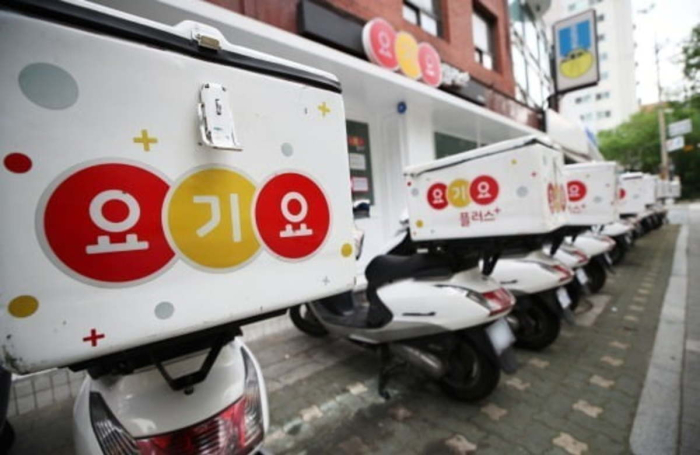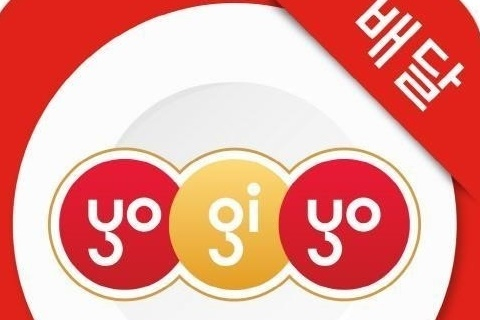Delivery app Yogiyo bidders narrowed to Shinsegae, PEFs
May 11, 2021 (Gmt+09:00)
Samsung shifts to emergency mode with 6-day work week for executives


CJ CheilJedang to sell feed, livestock unit for $1.4 bn


Samsung Electronics' key M&A man returns; big deals in the offing


Affinity to buy SK Rent-a-Car at $572 mn, more deals expected


Keppel REIT to sell Seoul-based prime office T Tower



Germany's Delivery Hero SE has narrowed down the list of bidders for South KoreaŌĆÖs second-largest food delivery platform Yogiyo to Shinsegae Inc.'s e-commerce spin-off SSG.COM and private equity firms, including MBK Partners and Affinity Equity Partners, according to investment banking sources.
Other PEFs on the shortlist are Permira and Bain Capital, while South Korea's largest travel platform Yanolja was dropped from the list, the sources said on May 10.
The candidates will begin due diligence on Yogiyo this week, for which the estimated price tag varies widely from as low as 500 billion won ($446 million) to as high as 2 trillion won ($1.8 billion).
The planned sale, handled by Morgan Stanley, had drawn about 10 non-binding bidders. The German food delivery service provider must complete the sale by no later than February 2022.
Shinsegae is the only strategic buyer among the shortlisted bidders. On May 11, the retail giant closed its 265 billion won acquisition of domestic online fashion platform W Concept from IMM Private Equity. It has also made it to the final round of the bidding for eBay Korea.
But an investment banker voiced caution over the Yogiyo deal, with third-ranked Coupang Eats stepping up challenge to bigger rivals after its parent Coupang Corp. raised more-than-expected $4.6 billion in a New York initial public offering in March.
"Compared with the rivals Baemin and Coupang Eats, Yogiyo has been losing market share. Its buyer will likely need to make a substantial investment," he said.
"From the perspectives of PEFs, it seems uncertain whether Yogiyo can enhance its corporate value over the next four to five years. It remains to be seen whether the shortlisted candidates will enter the final bidding round," he added.
Baemin commands 66% of the food delivery service market in South Korea, followed by Yogiyo with 17.9% and Coupang Eats with 13.6%, according to the Global Bigdata Research, a Korean data provider.

BUILDING IT INFRASTRUCTURE
Global PEF managers admitted to the difficulty of assessing Yogiyo's value. The biggest problem is how to build an IT infrastructure for the delivery app from scratch once it is separated from the German delivery giant, and how much it would cost.
Yogiyo has been using Delivery Hero's big data and algorithms for fees from the allocation of riders to the mobile display of restaurants. Thus, its new owner may have to build its IT infrastructure, which some industry observers estimate may cost as much as starting a business.┬Ā
In July of last year, the Korean food delivery app launched Yogiyo Express for fast and reliable delivery services by adopting Delivery Hero's technology solution "Hurrier." But in the worst-case scenario, the express service may need to be stopped because the Hurrier is Delivery Hero's proprietary solution.
"I have been working in the PEF business for over 10 years, but this is the most complicated deal I have ever experienced," a global PEF source in Seoul told Market Insight, the capital news outlet of The Korea Economic Daily.
A prospective buyer may have some conditions attached to continue to use Delivery Hero's IT infrastructure for the next few years. But that would result in leaking Yogiyo's sales data to the German company's new Korean unit Baemin and then the dominant Korean delivery app could utilize the data.
Further, a buyer may not use debt financing for the Korean delivery app with almost no tangible assets, because of the lack of collateral to use for borrowings. PEFs typically fund half of their acquisition deals through loans.
Reflecting such concerns, some PEFs wrote down less than 1 trillion won in their non-binding bids, according to the sources.
┬Ā
By Chae-yeon Kim and Jun-ho Cha
why29@hankyung.com
Yeonhee Kim edited this article.
-
 Delivery platformsDelivery app Yogiyo draws bids from retailers, PEFs
Delivery platformsDelivery app Yogiyo draws bids from retailers, PEFsMay 05, 2021 (Gmt+09:00)
2 Min read -
 Delivery appsSale of KoreaŌĆÖs No.2 delivery app Yogiyo kicks off with May 4 prelim bid
Delivery appsSale of KoreaŌĆÖs No.2 delivery app Yogiyo kicks off with May 4 prelim bidApr 07, 2021 (Gmt+09:00)
2 Min read -
 M&AsDelivery Hero could face up to $1.4 bn in fines if it fails to sell Yogiyo
M&AsDelivery Hero could face up to $1.4 bn in fines if it fails to sell YogiyoJan 18, 2021 (Gmt+09:00)
2 Min read -



